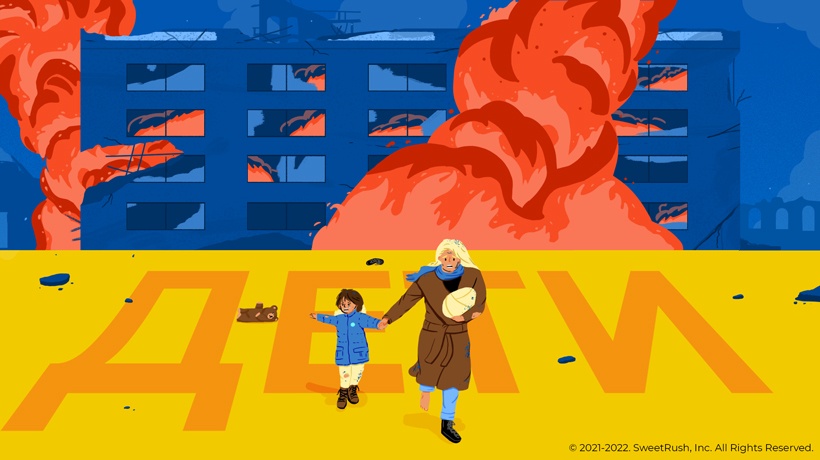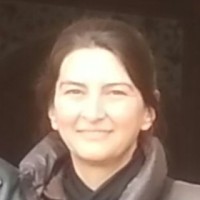A Ukrainian Shares His Perspective With Colleagues
Misha’s email comes in around 12:30 a.m. my time, Tuesday night. It’s been hours since we zigzagged through our first interview: a sprawling discussion of Russian history, the future state of the war, imperialism and propaganda, the looming refugee crisis—multiple tentacles, each its own set of stories, volumes in length, all interconnected. I’m getting only a glimpse of something impossibly large.
Misha understands this. He’s taken some time to reflect. He sends me this email because, maybe, he feels guilty for “unloading,” as he calls it. There is one story, he says, “that really is stuck in my head.” He includes an embedded video: Misha walking me through several images, like an impromptu slide presentation.
“So,” he says, and pauses longer than I’m expecting. “The story is this.”
On screen: photos of theaters in the Czech Republic, each with the same Russian word spelled out in lights and candles in the entrance courtyard: ДЕТИ—deti, “children.”
Next slide: the Palace of Culture and Science in Warsaw. A grand, ambitious hybrid of the Empire State Building, Big Ben, and the Pantheon. Painted in huge yellow letters in front of the entrance: ДЕТИ.
Next slide: a theater in Germany. Activists spray-painting Russian letters onto the cobblestone entrance: ДЕТИ.
Then Misha shows a satellite photo of the Donetsk Regional Drama Theater in Mariupol, Ukraine. On either side of the building, painted in capital letters on the plaza tiles, a warning that no one seriously thought would be ignored: ДЕТИ. CHILDREN.
It is one of the last images of the theater before a Russian bomb destroyed it—with everyone inside.
* * *
Misha Milshtein, an American from Ukraine, is the director of engineering at SweetRush, where he’s worked since 2003. I’m a learning experience designer and writer, so our paths don’t often intersect. But I know his reputation as an inspirational leader; he’s known to take people under his wing. After years of light work-talk, the abrupt switch to a set of deeply personal interviews has been disorienting but illuminating.
He’s lived in California since he was 20, shortly before the fall of the USSR. Until very recently, he said, he considered himself more American than Ukrainian.
I try to probe this gently. How starkly are you feeling this separation? What’s it like to watch this happening from far away, as part of the diaspora? What emotions are you parsing? Guilt? Relief? Helplessness?
Not so much separation. “But guilt, yeah,” he says.
“This combination of pride and guilt and constant horror, it also gives you motivation to find something to contribute.”
Misha talks about donation drives for which he’s been volunteering. He talks about sorting food and relief items for Ukrainian refugees in the neighboring countries taking in everyone they can. He talks about raising donations for organizations and individual Ukrainians alike.
He talks about his time at the US-Mexico border, where, for now, all Ukrainian refugees must enter the country. He talks about the slow trickle of people allowed across after two- or three-day waits, about the inadequacy of accepting only 100,000 refugees when millions have been displaced. He shares news stories about his group of volunteers providing food and shelter and simple compassion to those waiting, and what it’s like seeing the absolute weariness and relief on their faces when they make it.
“Physical work takes the edge off. Moving boxes, sorting stuff, organizing people,” he says. “All of this is a good distraction. You feel that you’re doing something. You’re being productive.”
* * *
I replay his video.
“It’s not just the theater,” Misha says. “It’s also the city of Mariupol itself. Look at this.”
He shows an aerial photo of a city 29 days into its siege. It is a palette of browns and grays. Later, cross-referencing this picture against satellite and street-view images, I’m able to find the same areas and buildings and compare. A before and after, from sun and light to ash and smoke.
In the news, mayor Vadym Boichenko is quoted as estimating that 90% of Mariupol has been destroyed. I think about my house on my block in my city and what it would mean to have bombs landing, everything rubble, no place to go.
* * *
Misha struggles to describe how emotionally and mentally overwhelming this war has become. How much it has overtaken his daily thoughts. I wonder if he worries his words aren’t doing it justice, in the way I worry my retelling won’t.
“One of the features of this reality is being completely, constantly aware of what’s going on. It’s a complete immersion,” he offers, but this doesn’t feel adequate either.
So he tries something.
On his screen, suddenly: a little girl, coloring book open on her lap, sitting atop a pile of blankets—an improvised bed. Peeling paint on the concrete walls behind her.
Somewhere in his mind,“there’s a projector playing this in the background constantly.”
He hits auto-play, and now it’s quite literally playing in the background. The image changes to a chaotic scene from a makeshift hospital: women lying on beds, nurses and doctors tending to the wounded. It shifts again, to a familiar-looking pregnant woman lying on a stretcher with a watermelon-patterned blanket. I remember this image, but Misha says it aloud: the Russian military bombed a maternity ward, also in Mariupol. This woman and her baby died.
I watch as he speaks.
“If you can, don’t pay too much attention” to the images on his screen. It’s impossible not to, which is the point, of course. For him as well, “there’s never a minute of rest from this.”
The rest of our interview is like this. Misha talking about his experiences, answering questions, probing memories. In front of us both, images from the projector of his mind.
I ask about his pre-invasion mindset. How predictable or unpredictable was this?
(A satellite photo of the Mariupol theater, but after the bombing. A cratering hole where half the building used to be, spots of white that might have been bricks, splotches of red all around. “ДЕТИ” still visible on the west side, but on the east, too, buried by debris to see.)
He tells me he almost wasn’t surprised the Russians went through with it. But at the same time, he was as shocked as anyone. He hadn’t wanted to believe it could really happen.
(Close-up of a woman with gauze covering her forehead, drying blood on her face. Olena Kurilo, whose same image went viral after she vowed to “do everything for my motherland.” She looks both wry and furious.)
“I think we all were sucked into this new reality so quickly,” he continues.
(A dazed man, blood-soaked through his pants, being led down rubble-covered stairs by police.)
“I think, for a while, part of you is still rejecting the reality,” he says. “You know it’s happening, but…not really, just because it’s something that cannot be.”
(Another woman, her face transformed by bruises, swelling, lacerations, covered in a green-blue disinfectant used to treat open wounds. I wonder what she looked like on her last normal day. I wonder how many friends wouldn’t recognize her.)
“So, kind of surreal?” I ask, looking at a child’s playroom, soccer balls scattered amongst bricks blown in from a gaping hole.
“Still is. To a certain degree, it still is.”
* * *
On screen: the burned-out husk of a car, yards away from a column of fire.
* * *
The hardest parts in the last month have been when he’s gone on long solo drives.
“It is when you’re by yourself in a confined space. That’s when it starts hitting.”
Working takes the edge off, a little. SweetRush has given Misha the space to do what he needs, but working provides some respite while adding a sense of normalcy. Even then, he’s glued to the headlines.
I ask about breaks. Breaks from the news to watch a comedy, do some gardening, some kind of escape.
“Anyone’s prone potentially to being burnt out,” he concedes. “But what are you going to do? Put yourself on a schedule? Allow yourself only 15 hours of horrifying images?”
This doesn’t really answer the question. We talk around it a little more, until Misha acknowledges that he doesn’t want to give himself a break. He wants to be present, as if he sees presence itself as an act of duty.
We keep returning to this idea of obligation.
The food drives and donations help ground him, help him feel like he’s doing something. He hopes to return to Ukraine when the war is over to help rebuild, and that gives him the sense that he’s doing his part.
But so does watching the news. Misha worries about desensitization, about inaction, about complacency. Keeping up with what’s going on, not turning away from it, feels almost as important as anything else he can do.
“As horrible as it is, I’m not there. I’m not in danger.” If that’s just the guilt speaking, he shrugs it off.
* * *
On screen: a woman walking through a smoky post-apocalypse, past twisted skeletal things that used to be trees.
* * *
When we talk about Russian history and the current political culture, there’s an uncomfortable bit of familiarity in much of what Misha describes. Particularly for us, in this conversation between two Jews living in America.
A nation, embarrassed by and angry about past losses, grasping onto illusions of imperialism and making itself great again. A leader in self-isolation, more concerned with his own power than with building up the country, the economy, or his people. A population that supports him because he tells them what they want to hear, even when it goes against their interests. A people whose gradual concessions of their own power have made them nonetheless complicit. A media used as the propaganda arm of the state. A world thinking this is a local problem. An army just following orders.
* * *
On screen: an 11-year-old girl lying in a bed, scar crawling in a crescent shape from mid-cheek to ear to throat. A Russian soldier shot her in the face. She’ll have this scar for the rest of her life.
“She also got lucky,” Misha says, interrupting another thought. “She survived.”
* * *
But days later, it’s a new atrocity. Reports of mass graves in Bucha, a small city outside of Kyiv, where Misha’s wife had her high school prom. Images of corpses left in the streets, wearing civilian clothes, some with hands bound behind them. Raped, executed. Bodies burnt.
Putin’s Russia is committing war crimes—language much of the West adopted overnight—too quickly to parse and prioritize, overshadowing horrors from just days before.
What’s a maternity ward bombing when a theater housing more than a thousand is destroyed? What’s a theater destroyed when civilians in a small city are systematically hunted down and raped and killed?
What will be the next thing that makes us forget the last?
Days before the Bucha massacre, Misha described this strategy: you attack and kill civilians so ruthlessly that your opponent gives up—not because of military losses, but because the awfulness of it is too much to overcome.
* * *
On screen: a man, cigarette dangling from his mouth, small dog clutched to his chest.
On screen: a very old woman, scarf wrapped around her head, walking away from the ruins of a home.
On screen: eight children huddled together, sitting on a shelf.
* * *
Misha sent another email after our last interview. A final thought, he called it.
For as long as the war lasts, he says, “I don’t want this to become yesterday’s news.” Because it’s a “now situation.” People are suffering now.
“I almost feel that it’s my obligation to feel this in the moment for as long as it is happening. I don’t want myself to become numb, I don’t want others to become numb,” he says. “Because the consequences will be very, very severe.”
Not just for those in Ukraine, he says, but for the world. “We know what’s at stake.”








